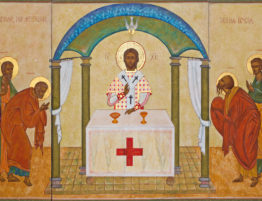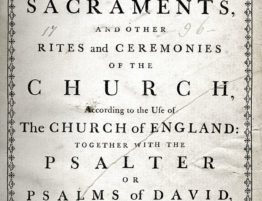
Text: Romans 15:4-13
Today, the Second Sunday in Advent, is often called “Bible Sunday” in Anglican circles due to the theme articulated in our Collect (page 92 in the Prayer Book):
Blessed Lord, who hast caused all holy Scriptures to be written for our learning; Grant that we may in such wise hear them, read, mark, learn, and inwardly digest them, that by patience and comfort of thy holy Word, we may embrace, and ever hold fast, the blessed hope of everlasting life, which thou hast given us in our Saviour Jesus Christ. Amen.
Unlike most of the Collects in the Prayer Book, this one wasn’t written between 500 and 1000 A.D. Rather, it was written by Archbishop Cranmer himself in the 16th Century at the time of the Reformation. This has been a favorite prayer among Anglicans; it’s often cited in larger catechisms, like the ACNA one, and is a personal favorite of mine. But what does this have to do with our Advent theme of expectation as we remember our Lord’s first coming and await his second? In short, focusing on the Bible at this time helps frame our expectation. It puts the expectation in context. The late Dr. Peter Toon, one of the greatest Anglican minds of the 20th Century, puts it this way:
It is most fitting that at the beginning of the Christian Year the gift from God of the Holy Scriptures is celebrated by the Household of God. We, who are Christians, live in the light of the First Coming in humility of the Lord Jesus even as we look for his Second Coming in glory (see the Collect for Advent 1 for the Two Comings). All the time in this interim period of grace we are to be taught by his sacred Word, the Holy Scriptures.
Our Epistle reading from Romans 15, beginning at Verse 4, gives us a hint of how this works (again, page 92 in your Prayer Book):
Whatever was written in former days was written for our instruction, that through endurance and through the encouragement of the Scriptures we might have hope.
Last week we talked about how we live in a kind of Babylonian Exile as we await the final redemption and restoration of Creation with our Lord’s Second Coming. As Exiles, we are always in need of hope. It’s easy to get discouraged when we see the evils of the world. It seems like our Lord lingers and lingers, while things go from bad to worse. St. Paul tells us that the Scriptures give us encouragement and instruction so that we might have hope. How is it that the Scriptures do this? What is the nature of this encouragement, and instruction that builds our spiritual endurance?
In our Children’s Church for the last couple of years, we’ve drawn much of the material from The Jesus Storybook Bible by Sally Lloyd-Jones. In our house we’re reading a story a night from The Jesus Storybook Bible to Leah as part of our family Advent devotionals, as there are 24 stories leading up to Jesus’ birth. In the first of those stories, Lloyd-Jones has a great description of what the Bible is, and what it isn’t. She writes:
Now, some people think the Bible is a book of rules, telling you what you should and shouldn’t do. The Bible certainly does have some rules in it. They show you how life works best. But the Bible isn’t mainly about you and what you should be doing. It’s about God and what he has done.
Did you catch that? The Bible isn’t about you and what you should and shouldn’t do; it’s about God and what he has done. To reduce the Bible to a rulebook doesn’t lead to hope; it leads to despair because we’re terrible at keeping the rules! Lloyd-Jones continues:
Other people think the Bible is a book of heroes, showing you people you should copy. The Bible does have some heroes in it, but (as you’ll soon find out) most of the people in the Bible aren’t heroes at all. They make some big mistakes (sometimes on purpose). They get afraid and run away. At times they are downright mean.
One of my favorite thing about the biblical accounts of the saints we see in the icons around the chapel is how very human they are. Yes, we look to the saints as examples, but the biggest example is how much they needed God’s mercy just like you and me. Continuing the discussion from the Jesus Storybook Bible:
No, the Bible isn’t a book of rules, or a book of heroes. The Bible is most of all a Story. It’s an adventure story about a young Hero who comes from a far country to win back his lost treasure. It’s a love story about a brave Prince who leaves his palace, his throne – everything – to rescue the one he loves. It’s like the most wonderful of fairy tales that has come true in real life!
What a beautiful account. And guess what: you are the treasure. You are the one the Prince loves. This is why the Scriptures are such a source of hope. Look at Verse 8 from our Epistle:
For I tell you that Christ became a servant to the circumcised [that is, the Jews], in order to confirm the promises given to the patriarchs, and in order that the Gentiles might glorify God for his mercy.
Israel’s story in the Old Testament left us without proper resolution. In his classic book Methods of Bible Study that we will be studying in Sunday School next year), 19th Century Anglican Presbyter W.H. Griffith-Thomas calls the Old Testament “A Book of Unfulfilled Prophecies,” “A Book of Unexplained Ceremonies,” and “A Book of Unsatisfied Longings.” He then writes:
Jesus the Prophet fulfills (in His life) the prophecies. Jesus the Priest explains (in His death) the ceremonies; and Jesus the King satisfies (in His Resurrection) the longings.
Rather than leave Israel with all those problems that Griffith-Thomas notes, God sends his Son to fulfill all the promises made to the Patriarchs. And what about us Gentiles? God could have left us to stew in our wretched benighted paganism. But, as St. Paul said, God used the promises made to Israel to bring show us mercy that we might glorify God also. Israel’s Messiah becomes our King, our High Priest, our Ultimate Prophet as well.
As we root ourselves in the Scriptures’ promises, the Scriptures’ story of our Promised Redeemer, for whom we await in Advent, our Lord Jesus Christ, the encouragement and endurance from the Scriptures change how we relate to each other as well. Back up in the Epistle to Verse 5:
May the God of endurance and encouragement grant you to live in such harmony with one another, in accord with Christ Jesus, that together you may with one voice glorify the God and Father of our Lord Jesus Christ. Therefore welcome one another as Christ has welcomed you, for the glory of God.
The way Christ treated us, we then treat each other. God grants us the endurance and encouragement to lead to this. So rather than focusing on our behavior, our focus on Christ changes our behavior.
So, as we prayed in the Collect, God grants that we may hear the Scriptures proclaimed and preached in God’s church. He grants that we may read the Scriptures for ourselves. I’d encourage everyone to pick up a copy of our 2019 reading plan for use with the Offices. I guarantee you’ll read a lot of Scripture following it: the Old Testament in its entirety once, the New Testament twice, the Psalms almost 12 times, and a chuck of the Apocrypha (or Deuterocanonical books, if you prefer), as well! God will grant that we mark the Scriptures, that we will note them and pay attention to them. He will grant that we learn them, and inwardly digest them, slowly completely, so that we may indeed have the patience and comfort of God’s Word, embracing and holding fast to our hope in God’s promises in Christ, both those he has already fulfilled and those we still await.
The last word goes to St. Paul’s Benediction from the end of our Epistle:
May the God of hope fill you with all joy and peace in believing, so that by the power of the Holy Spirit, you may abound in hope.
In the Name of the Father, and of the Son, and of the Holy Ghost. Amen.




